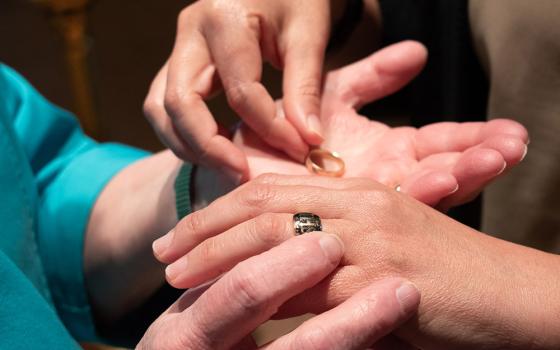
Divya P. John (inset) was a 21-year-old novice at the Basilian Sisters' convent at Paliekkara village in Pathanamthitta district of Kerala in southwestern India. She died by drowning in a well at the convent on May 7. (Provided photos)
On the morning of May 7, Divya P. John, a 21-year-old novice with the Basilian Sisters near here, attended class as usual, a church spokesman says. But an hour later, around noon, her body was found in a well at the convent. Rescuers retrieved the body and bypassed a nearby public hospital to transport it to a diocesan hospital farther away.
A subsequent autopsy found the cause of death to be drowning, but no time of death was given. Church officials did not seek a police crime scene investigation into the mystery of how she died, labeling the tragedy a probable suicide.
John's untimely death is the latest in close to 20 others since 1987 involving novices and sisters serving in Catholic communities in Kerala state in southern India.
The most notable was the murder of Sister Abhaya, whose body was found in 1992 at the bottom of her convent's well in Kottayam. Originally dismissed as a suicide, that case took a turn in 2008 after a criminal investigation deemed her death was a murder. Now, almost three decades after Abhaya's death, a priest and nun charged with her murder are undergoing a trial that only began in August 2019.
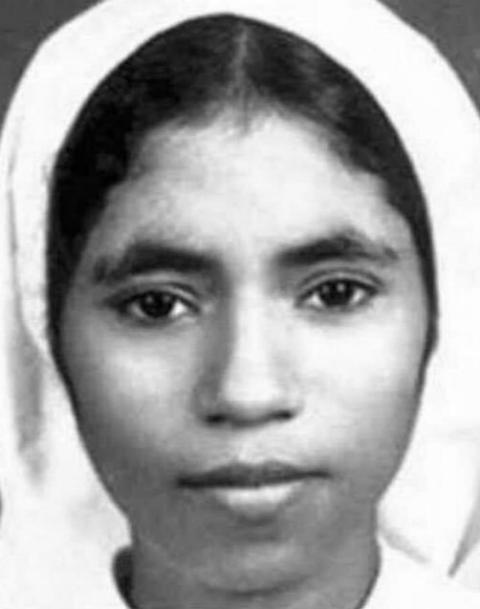
Sister Abhaya, member of St. Joseph's Congregation. Her body was found March 27, 1992, in the well of a convent in Kottayam, Kerala, India. (Provided photo)
Catholic groups have recently asked church authorities to take steps to dispel a growing mistrust in society regarding religious life and the deaths of John and other sisters.
"It is high time that the leadership of Conference of Religious India woke to this situation and put in place procedures and practical guidelines to prevent such deaths from taking place," Sisters in Solidarity, a group of Catholic nuns and laywomen who formed last year over concern about the issue, wrote to the religious major superiors in India in June.
The letter, which a GSR reporter viewed in electronic form, said that John's death in Kerala, a Christian stronghold, was "shrouded in mystery." Many questions remain unanswered weeks after her death, notes the group's June 18 letter, which asks the major superiors to conduct an independent probe to help unravel the mystery.
The letter was signed by eight nuns, seven laywomen and two women's groups and was endorsed by 95 priests and nuns.
While the letter signers and other Catholics are frustrated by the lack of investigation in many of these cases, the church's official stance has been to close them as probable suicides or accidents and keep the details private. Though the church has suggested many of the deaths are suicides attributed to depression, little has been done formally to address such a phenomenon within congregations.
In light of the ultimate murder determination in the high-profile Sister Abhaya case, this latest tragic death has cast a spotlight on similar cases that as yet have no real closure.
The Conference of Religious India is the national association of Catholic nuns, priests and brothers throughout India. According to the Conference of Religious website, the conference embodies 1,023 superiors general and provincials of 402 religious congregations. The total number of religious in India is more than 131,500. Women form the largest component with 104,500 members in 295 congregations.
Kerala, where almost all of the unnatural deaths of nuns have occurred, is home to nearly 35,000 women religious, about a third of all Catholic sisters in India.
Sr. Julie George, a Solidarity member and lawyer based in the western Indian city of Mumbai, told GSR by phone that the nuns' deaths under mysterious circumstances have sent the wrong message to society.
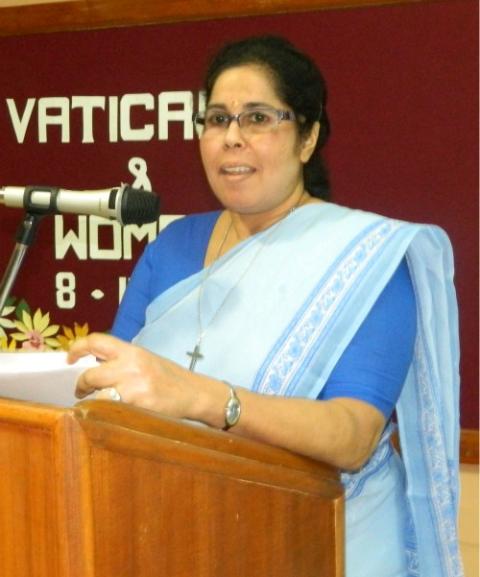
Sr. Julie George, a member of the Missionary Sisters, Servants of the Holy Spirit (Provided photo)
"Our image is tarnished before the public and our mission is questioned," bemoans George, a member of the Missionary Sisters, Servants of the Holy Spirit.
The Solidarity group wrote to the religious superiors after its June 1 letter to Cardinal Baselios Mar Cleemis, head of the Syro-Malankara Church, failed to get a response. The group urged the cardinal to investigate John's death independently, as the convent falls under his Oriental Catholic rite.
"We are deeply concerned about the increasing [number of] unnatural deaths taking place in convents, the latest one being under your jurisdiction in Kerala," the letter alerts the cardinal. The group sees "an alarming statistic" in so many nuns allegedly committing suicide over three decades, as the official church often cites as the cause in its responses on individual cases.
The group also points out that John had spent five years with the Basilian Sisters, a 99-year-old Italian congregation that works in India under the Syro-Malankara Church. Her congregation should have detected her suicidal tendencies during this period and taken appropriate steps, the critics contend.
Cause of death debated
The congregation and the Malankara church told GSR that the novice committed suicide. The state police crime branch will not release a statement until it completes the probe and submits its report. John's family members have declined to comment.
Fr. Santhosh Azhakath, public relations officer of the Tiruvalla Syro-Malankara Archeparchy, denies foul play in the novice's death, as the letter signers and activists suggest. "We have nothing to hide, as is being projected in media," the priest said in an interview.
He says the novice was in class until 11 a.m., and her body was found in the well soon after. But he does not confirm the time of death.
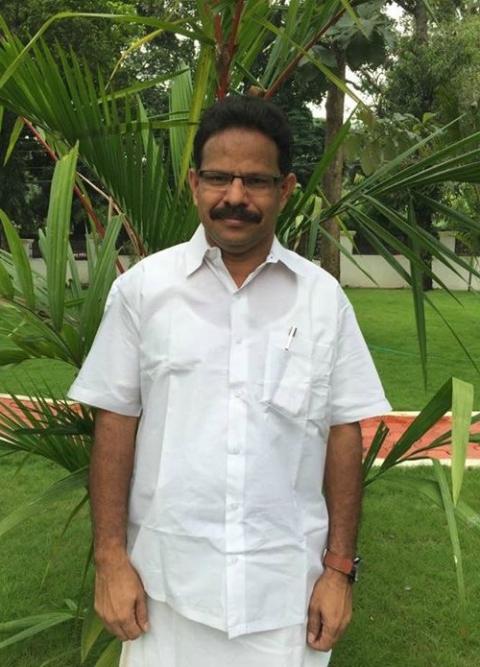
Jomon Puthenpurackal, a Catholic human rights activist in Kerala, southwestern India, seeks justice for nuns who have met with mysterious deaths. (Provided photo)
Neither does the initial autopsy report, which prompted Jomon Puthenpurackal, a lay leader and activist in the Sister Abhaya case, to suspect it was a murder. Even now, months later, the real time of John's death has not been disclosed, and a complete autopsy report has not been released.
Convent authorities took John's body to a diocesan hospital, bypassing a closer public hospital, where the autopsy was not done until the next day — all details Puthenpurackal says are suspicious.
Azhakath said he regrets that some people with "vested interests" are using "the sad death" to target the church.
When called for comment, Sr. Maria Agna, the superior of the Basilian convent, told GSR, "I have nothing to say about it as the case is already being investigated by the police." She then disconnected the call.
Puthenpurackal told GSR over the phone that he had demanded a probe by the police's crime branch team after the local police allegedly tried to treat John's death as a suicide "in a preplanned manner under someone else's instructions," he said, implying those of church officials.
The crime branch team's preliminary report found no foul play in John's death, but that determination was rejected by the team's boss, Additional Director General of Police Tomin J. Thachankary, who on May 21 ordered a fresh investigation. No report has been issued.
Timeline, autopsy questioned
Shaiju Antony, a Catholic lay leader and joint convener of the Save Our Sisters movement, also suspects foul play in John's death. He says, based on church and police sources, John's body was taken to a diocesan hospital under the instruction of the Malankara church for almost a day before being transferred to a government hospital, where the autopsy was conducted the next day, raising doubts over its results.
To dispel such misgivings, the church should investigate the case "in a transparent and ethical manner" to find the truth, the Sisters in Solidarity urge Cleemis in its June 1 letter. Relaying a message through his staff to GSR on Sept 22, Cleemis declined to confirm receipt of the letter or comment on its contents.
In its June 18 letter, the group warns the major superiors that their "indifference or silence out of fear in such situations would make us accomplices in the crime."
Other observers voiced similar concerns.
Sr. Jessy Kurian, a Supreme Court lawyer, wondered why the church and John's family were in a hurry to treat her death as a suicide. "If your married daughter's body is found in the well of her matrimonial home ... will you give the family a clean chit?" Kurian asks in an article published May 14 on The News Minute, an Indian news portal.
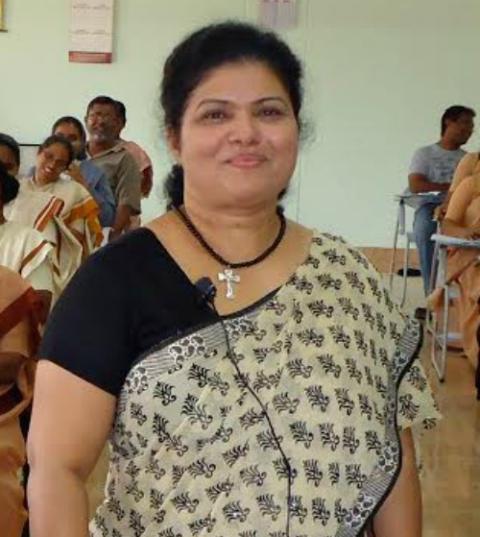
Sr. Jessy Kurian, a Supreme Court lawyer in India who first noted the unresolved cases* (GSR file photo)
Kurian, who was the first to point out India has reported more than 20 unnatural deaths of nuns in three decades, wants the church to ensure the safety and security of women religious and their trainees. "The parents who send their young daughters to the church should be ensured of the safety of their daughters," Kurian asserts in the article.*
The church, she adds, should investigate all untoward incidents involving nuns. Kurian declined the request to share a list of such cases.
The most publicized and sensational case was the death of Sister Abhaya, a member of St. Joseph's Congregation whose body was found in the convent well in Kottayam on March 27, 1992. It became the longest running murder investigation in Kerala. Police initially closed it as a suicide case in 1993.
After Puthenpurackal and his action council protested, the case was handed over to the Central Bureau of Investigation, a federal agency that eventually suspected two priests and a sister were responsible for the murder. They were arrested in 2008. A court acquitted one priest in 2018 and the trial of the other two suspects began Aug. 26, 2019. The closing of courts during the pandemic has interrupted the trial's progress in 2020.
In earlier action, the court rejected several witnesses, including sisters, when their testimony differed from their original statements 27 years ago. Others were too ill to testify or have died.
A long list of cases
The following 10 cases of nuns who met with unnatural deaths are drawn from Matters India and UCAN (Union of Catholic Asian News) reports:
- Sacred Heart Sister Jyothis, 28, was found dead inside a convent well in the Thamarassery Diocese in northern Kerala in November 1998. Local police said she committed suicide. Her father rejected the suicide theory and said he believed she was killed.
- Sister Paulsi, 35, of the indigenous Snehagiri ("mountain of love") Missionary Sisters, was found dead May 25, 2000, at her convent in the Palai Diocese.
- Franciscan Sisters of the Immaculate Heart of Mary Sr. Anoopa Mary, 23, was found hanging in her room in St. Mary's Convent in Kollam, Kerala, on Aug. 11, 2008. A suicide note in her pocket said she had been unhappy and told of a dispute with her superior.
- Six months later, on Feb. 11, 2009, Daughters of Mary Sister Josephine, 38, died in the congregation's provincial house in Thiruvananthapuram, Kerala's state capital. A press release from the Syro-Malankara archdiocese said she had been undergoing treatment for depression. Nuns in the convent found her room bolted from the inside and broke the door open to find her hanging from the ceiling fan. Sister Josephine's death led to protesting crowds alleging she had been harassed by the nuns.
- Up the western coast, in Goa state, Handmaids of Christ Sr. Dipti Brahmane was found dead in the well of her convent in Raia village on July 26, 2010. The congregation reported that the 24-year-old nun was under medication for depression.
- In the first of two unnatural deaths in 2011 in Kerala, Holy Spirit Sr. Mary Ancy, a 48-year-old teacher, was found dead Aug. 17, 2011, in a wastewater tank in Poonkulam, near Thiruvananthapuram. Her family rejected a suicide theory and demanded police investigate the death. A postmortem report found no signs of struggle and that she was conscious when she entered the water.
- On Oct. 10, 2011, Maria Roslin, 16, a novice of Our Lady of Mercy Convent in Aroor, was found hanging from a ceiling fan. A convent witness told police the novice was depressed after her father was in an accident. Police called it a "clear case of suicide."
- Sister Liza Maria, 42, a member of the Sisters of the Adoration of the Blessed Sacrament, was found dead Dec. 1, 2015, in a convent well in Uluppooni near Vagamon, a tourist resort in Kerala's Idukki district. A priest said she was undergoing treatment for depression.
- Sr. Susan Mathew, 54, a teacher and member of the Mount Tabor Convent under the Malankara Syrian Orthodox Church, was found dead Sept. 9, 2018. Her body, with deep cuts on her wrists, was floating inside the convent well at Pathanapuram in Kollam district. Police classified her case as an unnatural death as there was no clarity on whether it was a murder or suicide. Mathew had been under treatment for a long illness, police said.
- In Karnataka, a neighboring state of Kerala, Sr. Mary Sendra Vianney, 28, a member of the Sacred Hearts of Jesus and Mary Convent, was found dead on Dec. 4, 2019. Her severed body was discovered on railroad tracks near Hubli town. Police were investigating possibilities of suicide or foul play.
Advertisement
As all of these cases have come to a halt, George, the lawyer, urges the sisters to take charge of responding directly to the deaths. "It is high time that the women religious should empower themselves to decide their course of life rather than depending on the men in the church," she said, referring to clergy.
Some pro-women leaders, such as Fr. Paul Thelakkat, an editor who counsels women religious, wants the major superiors to make it a priority to address the unnatural deaths of nuns. Not doing so, the septuagenarian priest warns, would have "tragic consequences" that would eventually threaten the existence of nuns and convents.
He terms it "a pity" that society and the church now seem to treat nuns' suicides as "something not unusual."
The role of sadness and suicide
It's been 10 years since Thelakkat's Sathyadeepam ("light of truth"), a weekly of the Ernakulam-Angamaly Syro-Malabar Archdiocese, published the findings from a survey of Kerala's nuns.
Carmelite Fr. Joy Kalliyath quizzed 60 nuns ages 30-40 from four congregations serving Kerala's Irinjalakuda Diocese as part of his doctoral research. The priest undertook the study after 14 nuns reportedly committed suicide between 2000 and 2009 in Kerala. Others had eloped with priests or laypeople, and a few chose to leave the convent to live alone, the survey noted.
Thelakkat recalls that Kalliyath, who now works in Madagascar as a missionary, told him that suicides and elopements indicated crises engulfing the religious congregations in Kerala.
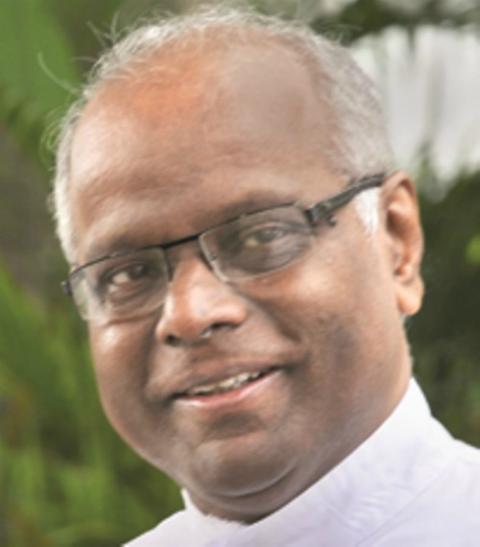
Fr. Paul Thelakkat, editor of the Sathyadeepam, a weekly magazine of the Ernakulam-Angamaly Archdiocese (Provided photo)
Thelakkat shared highlights of the survey with GSR from his work with Kalliyath during publication.
One-fourth of respondents expressed unhappiness over their way of life, the survey said. Many of the women said they took life seriously only after becoming nuns.
Around 5% of the nuns interviewed said they felt like "fish out of water" in their convents. One-fifth of them felt accepted sometimes and rejected at other times.
Kalliyath noted that when nuns felt unwanted in their communities, they lost self-respect, which in turn led to disenchantment and depression.
Unhealthy class distinctions were noted in some Kerala convents. Highly qualified nuns with well-paid jobs enjoyed greater freedom and power, while the less qualified were sidelined and ignored, leading to frustration.
All this has led to "a drastic decline" in the number of women joining convents, says Divine Word Fr. Jomet Joseph, director of the Kerala Vocation Service Centre.
He said modern families with one or two children are a big challenge to religious life because the offspring are less likely to be encouraged to join an order or congregation, as they were when families were larger 30 years ago. "Unlike in the past, children are more exposed to the opportunities in life and, therefore, seldom prefer to give up the luxurious life outside and become nuns," he explained.
Fr. Sebastian Thundathilkunnel, secretary to the Kerala bishops' Commission for Religious, disagrees that there are problems in convents that lead to nuns committing suicide.
"It is not correct to paint a bad image of convents with isolated incidents of suicides of nuns," says the priest, who is the superior general of the Vincentian congregation and president of the Kerala unit of the Conference of Religious. "It is absolutely absurd to say everything is wrong with the church and convents just because of some isolated incidents of nuns committing suicide," Thundathilkunnel told GSR.
"Suicide is nothing new in Kerala," he says, as the state accounts for 6% of all suicides in India. That is more than double Kerala's share — 2.6% — of India's 1.38 billion population.
However, he said, "every suicide is painful, especially of nuns who have dedicated their lives for witnessing Christ."
[Saji Thomas is a freelance journalist based in Bhopal. He has worked for several mainstream newspapers, such as The Times of India. He writes regularly for Matters India, a news portal that collaborates with GSR and focuses on religious and social issues.]
*This article has been edited to remove identifying information at the request of the source.


